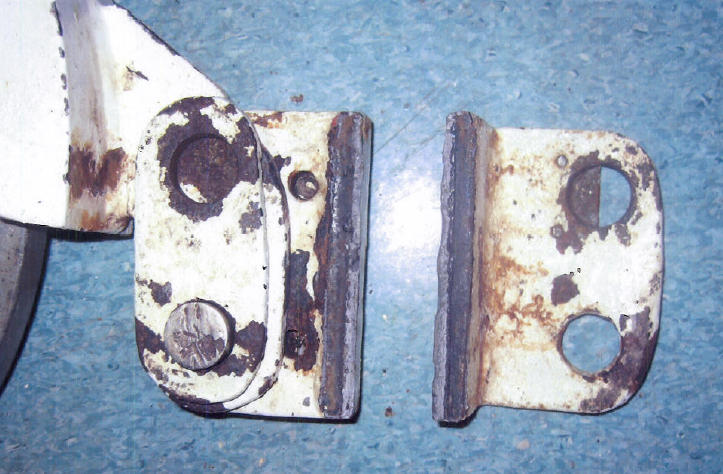Failure of welding on hyperbaric rescue chamber medical lock door assembly
A member has reported that a weld failed on the medical lock door assembly of a hyperbaric rescue chamber. The incident occurred during a pressure test of the system and an employee sustained serious injuries after being struck by the displaced medical lock door.
A report commissioned by the company, conducted by an independent metallurgical laboratory, identified that the welds in the bracket could have failed at any time due to there being less than 1 mm of weld remaining. This was partly due to corrosion of the metal and partly due to poor welding.
It was calculated that a downward force of 10-20 kg would have been sufficient to cause the weld to fail. The full penetration weld within the bracket was only 0.8-1.0 mm thick at best and the supporting fillet weld had no fusion along one of its lengths.
These pictures show the hyperbaric rescue chamber medical lock door assembly and the positioning of the C clamp retaining bracket, the second picture clearly indicating a weld feature that failed whilst in operation.


The company’s findings were as follows:
- The C clamp retaining bracket was never regarded as being a load bearing or critical component and as such was never included in ‘routine’ checking or inspection of the assembly.
- At the time of installation of the assembly the engineering, certification or inspection regimes were not as stringent as they are now.
- It is recommended that all load bearing components within a dive spread are thoroughly inspected for signs of corrosion or damage.
Safety Event
Published: 24 August 2007
Download: IMCA SF 08/07
IMCA Safety Flashes
Submit a Report
IMCA Safety Flashes summarise key safety matters and incidents, allowing lessons to be more easily learnt for the benefit of all. The effectiveness of the IMCA Safety Flash system depends on Members sharing information and so avoiding repeat incidents. Please consider adding [email protected] to your internal distribution list for safety alerts or manually submitting information on incidents you consider may be relevant. All information is anonymised or sanitised, as appropriate.
IMCA’s store terms and conditions (https://www.imca-int.com/legal-notices/terms/) apply to all downloads from IMCA’s website, including this document.
IMCA makes every effort to ensure the accuracy and reliability of the data contained in the documents it publishes, but IMCA shall not be liable for any guidance and/or recommendation and/or statement herein contained. The information contained in this document does not fulfil or replace any individual’s or Member's legal, regulatory or other duties or obligations in respect of their operations. Individuals and Members remain solely responsible for the safe, lawful and proper conduct of their operations.
